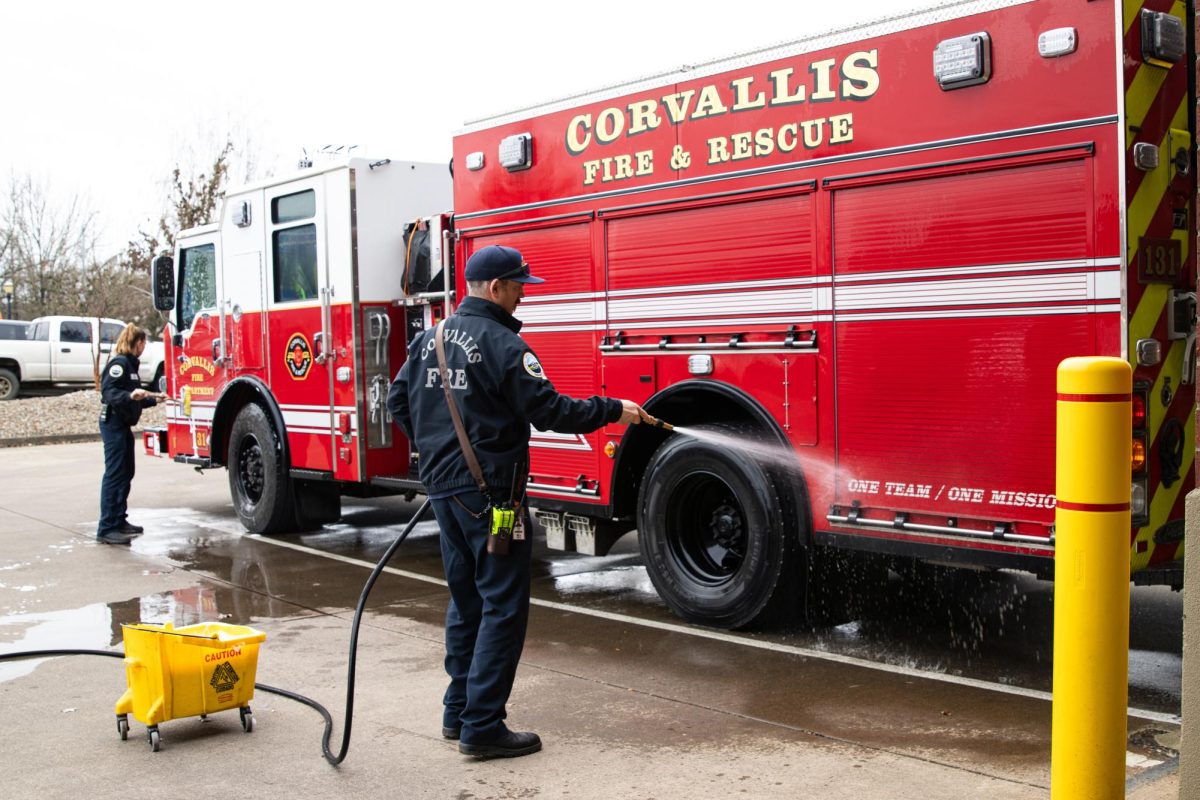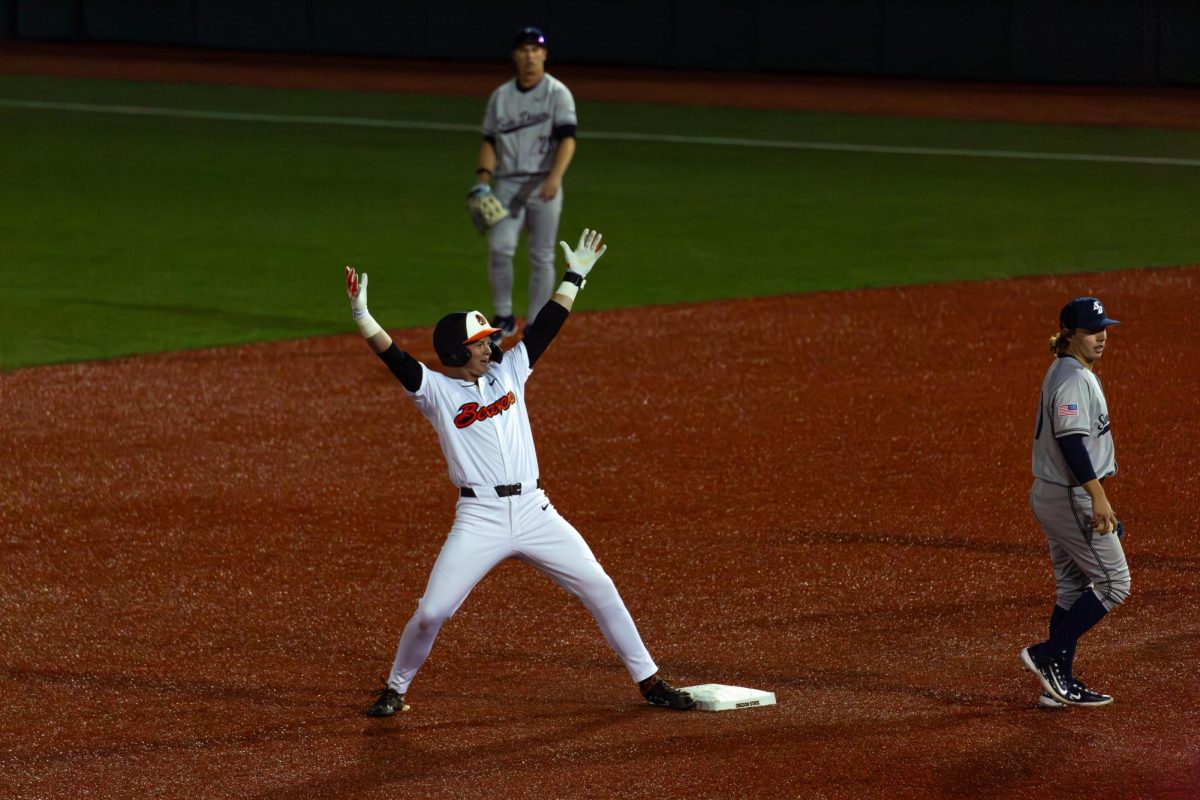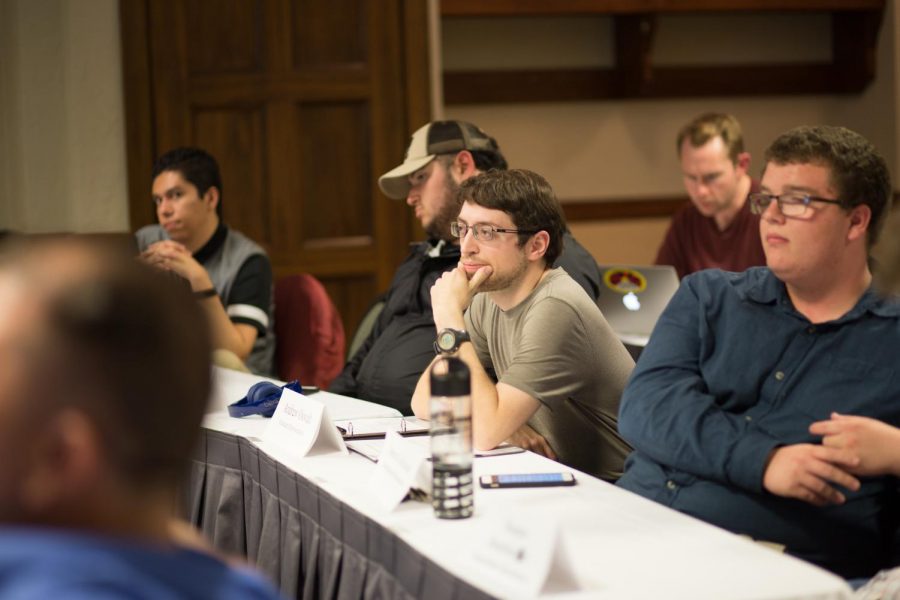‘Alt-right’ member of ASOSU faces removal, strong opposition to views
January 22, 2018
Editor’s Note: Select direct quotes from Rep. Andrew Oswalt have been paraphrased in order to follow the Society of Professional Journalists’ Code of Ethics principle “minimize harm”.
The ‘alt-right’, a loose collection of antiestablishment and white nationalist individuals, can be found on online message boards, in former presidential Chief Strategist Stephen Bannon and even in the Associated Students of Oregon State University.
Andrew Oswalt is a graduate representative in the ASOSU House of Representatives, a Ph.D. candidate in chemistry and a self-described member of the fringe political group. Oswalt’s stated views regarding differences between races and sexes are incongruent with both OSU’s and ASOSU’s core values and missions. Members of ASOSU have stated their opposition to Oswalt’s ideology, and the student government’s leadership intends to have him removed.
During his time within the House, Oswalt has extensively engaged in trolling—making offensive statements to provoke a reaction—such as introducing a resolution to replace leaf-blowers with rakes for university grounds maintenance. While expressing extreme social justice positions during House meetings, such as hating himself for being white, in reality he fundamentally disagrees with these ideas and other social justice policies, including affirmative action.
“Many of the statements I have made do not necessarily comport with my true beliefs, because what I am doing is a form of performance art,” Oswalt said. “I attempt to communicate a particular point through what some would call mockery or lampooning.”
This style of discourse is intended to caricature pro-social justice individuals within student government, according to Oswalt. The representative believes that regardless of the stated goals these left-leaning activists have, their core philosophy is the hatred of white people. Calling himself a ‘warrior of truth,’ the representative wholeheartedly denounces these ideas as detrimental to the very groups they are intended to liberate.
Oswalt has stated that African Americans as a group are inferior to whites and would be wellserved to adopt more Western ideals, which were originally produced by white thinkers.
According to Oswalt, he has been called a racist for arguing that white individuals have greater intelligence than some other racial groups.
“I mainly just own it,” Oswalt said. “I stand by my statements and they can throw as many -ists and -isms at me as they like, but those words have become functionally meaningless in today’s society.”
Oswalt believes the media at large has unfairly characterized individuals with his set of beliefs as psychopathic. He advises all students to seriously question any ideas put before them, including their perceptions of him.
“I am not a Hollywood Nazi,” Oswalt said. “I am not interested in killing anyone. I am not interested in harming anyone. All I want is a frank discussion.”
Over his past four years as a doctoral student, Oswalt has worked as a graduate teaching assistant for upper-division chemistry courses, interacting with students of a variety of racial backgrounds. According to Oswalt, the majority of students that make it to the advanced classes he teaches come from certain racial groups and are predominantly one gender. Because of this, Oswalt has stated that these experiences reinforced his beliefs that there are differences in intelligence between people based on their race or sex.
With almost no scientific support for his claims, Oswalt’s beliefs regarding intelligence differences between races and sexes are not well-represented in the rest of ASOSU.
ASOSU President Simon Brundage fundamentally disagrees with Oswalt’s point of view, but noted that it is not his role to police the membership of the legislative branch, and Oswalt was fairly elected to represent the student body in the House.
“Obviously, I do not believe these white supremacist views represent the student body,” Brundage said. “I think it is important that folks like him have those beliefs clearly articulated so students can make an informed decision. If voters knew about the beliefs espoused by this individual, I do not believe he would have been voted in in the first place.”
According to Brundage, he was aware of rumors surrounding Oswalt’s white nationalism, but did not have any concrete evidence that the representative held these beliefs.
“I do not believe those views have a place within ASOSU because they are inconsistent with our mission statement, they are inconsistent with our vision statement and, above all, are inconsistent with the values that make the United States great in the first place,” Brundage said. “I firmly believe diversity is our strength.”
Oswalt does not share the same views about diversity as Brundage. Displeased with the direction many others within mainstream society are heading, Oswalt’s vision of the future is one of race-based nationalism, where different racial groups exist independently of one another rather than coming together in the traditional case of the United States.
“Diversity is the opposite of unity,” Oswalt said. “I think it is natural behavior to wish to associate with those who are like you.”
Oswalt’s opinions on diversity can be seen in the legislation he has authored. On Jan. 17, the representative introduced a resolution in the House aimed at ending institutional discrimination by, to the extent possible, barring all collection of demographic information.
“You cannot discriminate against someone if you have no basis on which to discriminate,” Oswalt said.
The ASOSU Congress as a whole has not acted in accordance with Oswalt’s beliefs, according to Brundage.
“Rest assured, if any legislation passed that reflected these views, I would veto it immedietly,” Brundage said.
Regarding the impact of these views, ASOSU’s Faculty Adviser Drew Desilet highlighted the organization’s anti-discrimination language in Article II of the ASOSU Constitution, which bars discrimination in any of its policies, procedures or practices based on race, ethnicity, sex and a number of other characteristics.
“The ability of the ASOSU to move beyond impactful incidents is entirely up to the elected leadership of the organization to continuously provide the mechanism for self-representation and self-advocacy to their constituents, and space for dialogue within the student body on what values the entire community holds,” Desilet said in an email.
According to Desilet, individuals are able to formally file a complaint regarding the behavior of ASOSU officers, employees or elected officials’ conduct. The Oversight and Ethics Committee within the Senate is responsible for addressing these concerns. Desilet also referred to Article III, Section G, Part 2 of the student government’s constitution, which outlines the procedure to expel a member of Congress for ‘disorderly behavior’ with a two-thirds vote.
Speaker of the House Peter Halajian intends to pursue this option during the chamber’s meeting next week, after the Jan. 24 joint session where only student fees can be discussed. As a representative, only the House needs to consider whether Oswalt should remain in the body. A member will make a formal motion to expel Oswalt and the representatives will discuss the issue and put it to a vote. According to Halajian, he fully expects the “alt-right” representative to be expelled, but wants concrete evidence of Oswalt’s beliefs before taking action.
“I do not want to just fire from the hip and do something that could potentially backfire on us,” Halajian said. “We have been focused on ways to handle it, and handle it correctly, so that this issue could be put to bed for the rest of the year.”
If Oswalt is expelled, he will not be able to serve in ASOSU this academic year, but would still be able to run for re-election next year, according to Halajian.
“I would hope that it causes people to come forward about views that are similar to Oswalt’s,” Halajian said. “When it comes to legislation, I am not okay with people having views that are that contrary, that are not just dissenting but hindrances.”
University administration also expressed a commitment to creating an all-inclusive environment. According to Charlene Alexander, the vice president and chief diversity officer in the Office of Institutional Diversity, all students are expected to adhere to the Student Code of Conduct and Community Standards. Additionally, employees are expected to follow the values of the university.
“While these comments are meant to intimidate those that are the target of such viewpoints, I am confident that views such as these are absolutely in the minority at Oregon State,” Alexander said in an email in reference to statements about racial superiority.
On an emotional level, Aiden Tariku, an ASOSU senator, would like to see Oswalt forced out of the body. However, on a political level, he would reserve passing judgement on his fellow legislator until he better understood where Oswalt’s racist beliefs came from.
“I can relate to Andrew; I have always felt like the odd man out,” Tariku said. “I certainly have very different beliefs and views to Rep. Oswalt, but I can still relate to someone whose beliefs are counter to everybody else’s.”
Tariku is not surprised that someone with Oswalt’s beliefs is within ASOSU, but was shocked by the openness with which the beliefs were articulated. According to Tariku, if he were to talk with Oswalt, he would listen and attempt to understand the “alt-right” representative’s views.
According to Oswalt, he is no stranger to being ostracized. During his undergraduate work at The Evergreen State College in Washington state, he encountered what he described as authoritarian tendencies from his left-leaning classmates and administrators.
“It was not about inclusion or diversity or anything else,” Oswalt said. “It was about attacking me, a white man, and people like me.”
In response to Oswalt’s beliefs in general, Halajian has had time to reflect on what he hopes from ASOSU in the future. The speaker would like to see members of ASOSU and students at-large pay closer attention to what is said in debates and listen for these sorts of beliefs. He himself intends to spend more time looking for signs of racism in the future, as well as being less tolerant of trolling.
“I would encourage people who are concerned about this—who are graduate students—to run,” Halajian said. “I would also encourage people to pay attention to this election in general. If you have a problem with it, you need to take part in solving that problem.”
The filing deadline to run for ASOSU offices next year has been extended to Friday, Jan. 26 at noon. The presidential debate will be broadcast live Thursday, Feb. 8 by KBVR-TV at kbvr.com/watch and voting will be begin online Feb. 12 at 12:01 a.m


















































































![Newspaper clipping from February 25, 1970 in the Daily Barometer showing an article written by Bob Allen, past Barometer Editor. This article was written to spotlight both the student body’s lack of participation with student government at the time in conjunction with their class representatives response. [It’s important to note ASOSU was not structured identically to today’s standards, likely having a president on behalf of each class work together as one entity as opposed to one president representing all classes.]](https://dailybaro.orangemedianetwork.com/wp-content/uploads/2025/03/Screenshot-2025-03-12-1.00.42-PM-e1741811160853.png)
























